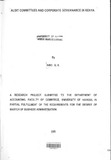| dc.description.abstract | Market regulators, commissions and accountancy bodies have all recommended the establishment
of audit committees as an important step in improving corporate governance. Audit committees
comprising of independent non- executive directors assist the board.in fulfilling its responsibility to
the shareholders and investing public by enhancing the quality of financial reports and disclosures.
However,there is little empirical evidence as to whether audit committees really add any value to
the organizations that establish them.
This study, therefore, set out to examine the role of audit committees in corporate governance in
Kenya.The objectives of the study were to examine how audit committees in Kenya operate, how
,the committees relate to management, internal audit and the external auditors, their major
achievements and challenges and why some listed companies had not established audit
committees.
Primary data was collected via a questionnaire. The population comprised all the 48 companies
listed at the NSE. Twenty-nine responses were received representing 60 percent of the population.
Personal interview was used on 28 percent of the respondents while 72 percent were dropped and
picked later. Secondary data was collected from the annual reports of the respondents for the year
ended December 2004.The data was analyzed using frequencies, percentages and means.
From the analysis 93 percent of the companies have established audit committees with non executive directors,
they have written chatters and have on average 4.3 directors. The committees
meet on average 3.8 times in a year and each meeting lasts 2.2 hours on average. The audit
committees generally have a cordial relationship with the management, internal audit and the
external auditors with 100 percent of the respondents indicating that the relationship is positive to a
large extent. The major achievement was given as enhancing the independence of the internal
audit function and ensuring that its recommendations are implemented. Only two respondents
indicated that they had not established audit committees. The major reason given was frequent
changes management. | en |

